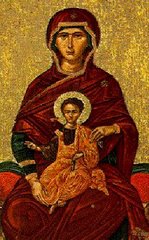 Today in class we played with Play-Doh, and by doing so we learned about how humanity mirrors God, our Creator.
Today in class we played with Play-Doh, and by doing so we learned about how humanity mirrors God, our Creator.First, you were given the opportunity to select which color of Play-Doh you would like. Second you were given five minutes in which to create something with that Play-Doh. Finally, you were allowed to talk with your friends while making your creation.
The two Creation accounts in Genesis reveal to us that God Created mankind in His own Image & Likeness. This means that humanity resembles God in some way (though imperfectly, for only God is perfect).
1. We have Free Will: our days are full of choices. Some are monumental (where do I want to go to college?), some are trivial (which color of Play-Doh do I want?). Even when limits are placed on our choices, we still retain the freedom to choose how we react to those restrictions.
2. We are Creative: One has only to look at the skyline of a city or open the cover of a literature book, even take a stroll through an art museum to see that humanity is creative. We are even given the ability to bring forth new life, though this power is to be used in the proper context of a committed and sanctified love (marriage).
3. We are Social / Relational: whether it be talking to our friends while sculpting with Play-Doh or engaging in deep conversations that last into the wee hours of the morning, our lives are a giant web of relationships. God is also, in one sense, a relationship. Rather than a single being, God exists as a community of persons held together in a perfect bond of love – the Trinity. We exist in a “trinity” as well, of relationships with God and with others, as well as our relationship with ourselves.

The movie Castaway, starring Tom Hanks, features a great illustration of our innate desire to exist in community. After securing the necessities of food, shelter, and safety, Hanks creates a “companion”, Wilson. The connection is so strong that one of the most emotionally intense scenes in the film is when Hanks loses Wilson at sea.
Unfortunately, our relationships are not held together by the perfect Divine Love, but rather by fragile human love. When we stop loving appropriately or even altogether (which we call Sin), we break our relationships. And to break our relationship with God, the source of all life, is to place ourselves on the path of Death.
The consequences of Sin are:
1. Separation / Alienation from God and from our Neighbor
2. Death (physical death, which is a consequence of Original Sin and spiritual death which is a consequence of personal sin).
Christ tells us He is the Vine and we are the branches. If we are to have life in us we must stay connected to him. And to stay connected to him is to Love God and Love our Neighbors.
Ad Jesum Per Mariam,
Mr. B

No comments:
Post a Comment